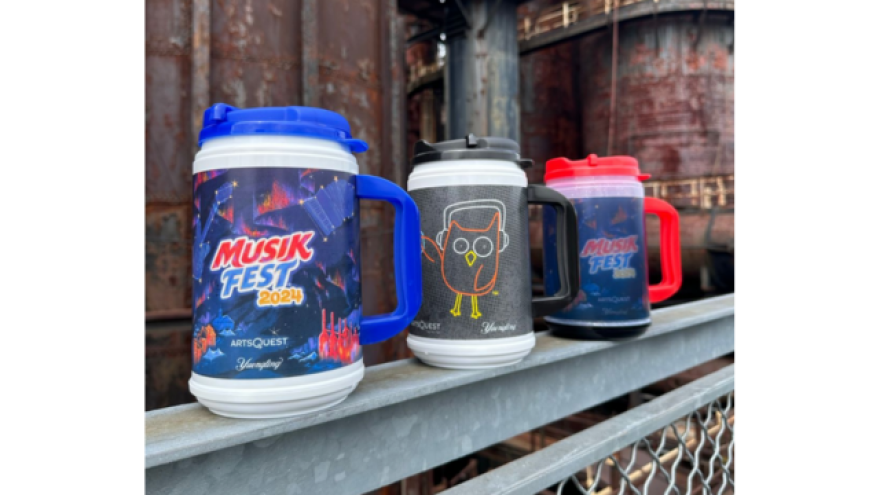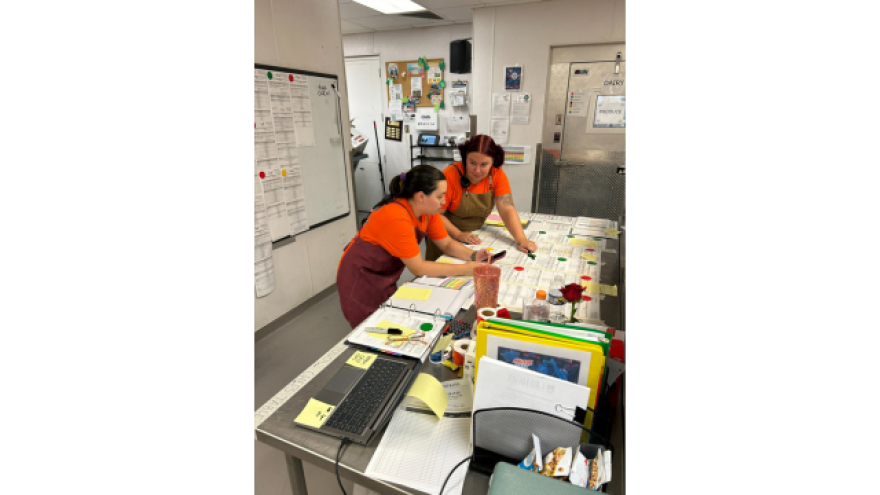BETHLEHEM, Pa. — Julie Marble has two questions for her staff during the long shifts feeding hungry Musikfest-goers.
“In the main kitchen, everybody's moving, so when food is up, I’ll yell, ‘There’s food in the window if you’re hungry!’ or, I’ll ask, ‘Did you guys eat today?’ and they’ll all say, ‘No,’” said Marble, executive chef of Levy Restaurants, ArtQuest’s food and beverage partner. “And I'm like, ‘OK, are you hungry?’”
“It's kind of like a set space where there's always food during busy seasons like this. It feels good to be able to help out and feed them.”
In its 41st year, Musikfest attracts tens of thousands of people to the city each day during its 11-day run. In recent years, organizers have eliminated paper food and beverage tickets, and started using renewable energy sources to power tents, vendors and beer trucks — but the work continues to make the event more environmentally-friendly.
Decreasing food waste through staff "family meals," using recyclable paper products, switching to LED lighting in parking lots and providing a bus route for visitors are some of the ways organizers this year are making the nation’s largest free music festival more sustainable.
“Internally, we’re very aware of food and food waste,” said Jennifer LoConte, director of communications for ArtsQuest, the nonprofit that presents Musikfest. “And reintegrating food use internally so that the staff gets fed for free each shift.
“They're also actively working with local organizations to find places for food donations. That’s something that we're hoping to get finalized – that's obviously going to help in a big way to eliminate food waste.”
Mugs, lights, traffic
When residents think about Musikfest and sustainability, the first thing that often comes to mind is the event’s iconic, and reusable, mug.

Illustrated by Banana Factory teaching artist Lauren Beck, the mugs are available in three styles: Classic, $13; Light Up, $16; and the limited edition Go Fest Yourself, $20.
Manufactured by Warren County-based Whirley Industries, the mugs are made from polypropylene plastic, a highly preferred recyclable plastic, LoConte said.
"We are reducing the carbon footprint because Whirley is in Pa., so the mugs are delivered right within our state. They're not having to travel from state to state.”Jennifer LoConte, director of communications for ArtsQuest, the nonprofit that presents Musikfest
“In addition to that, we are reducing the carbon footprint because Whirley is in Pa., so the mugs are delivered right within our state,” she said. “They're not having to travel from state to state.”
Organizers also finished a lighting change in parking lots – switching from fluorescent to LEDs.
“By 2035, the majority of lighting installations are anticipated to use LED technology,” according to the U.S. Department of Energy. “And energy savings from LED lighting could top 569 [terawatt hours] annually by 2035, equal to the annual energy output of more than 921,000 [mega watt] power plants.”
And, officials are working on cutting down transportation emissions and traffic by providing alternative transportation in, out and around the city.
In early July, officials announced a new partnership — including LANTA, ArtsQuest, the Greater Lehigh Valley of Commerce, Historic Bethlehem, the SouthSide Arts District and Bethlehem Parking Authority — to improve traffic and congestion during Musikfest.
The Gold line, which connects the north and south sides, will operate fare-free when boarding at any of the 14 shuttle stops, according to previous reports.
It joins LANTA's Blue line that will run from Trexlertown to Easton with stops in Allentown, and the Green Line, which will run from Whitehall to the Wind Creek Bethlehem casino.
“We're hoping that people will leave their cars at home, take the bus in and then there are stops all along Musikfest,” LoConte said.
‘100 people eating leftovers’
For the main stage area, Marble has three catering tents — all operating at the same time.
“You're feeding up to 300 people at each buffet sometimes,” Marble said, using chicken as an example. “At those buffets, you have to have two pans of chicken in each tent. So that comes out to six pans, and then you want them full all the time.
“A lighter load, after a big event like that, would be maybe three or four pans of chicken left at the end of the night. So the next day we cool it down, you can throw on some barbecue sauce and cheese and make quesadillas for the staff or you can put it in pasta.”
Currently, Marble has 44 staff members, including dishwashers and cooks. On top of that, there are bartenders and servers, too.
“We're talking 100 people eating leftovers that would have gone in the trash if we didn't give it to them."Julie Marble, executive chef with Levy Restaurants
“We're talking 100 people eating leftovers that would have gone in the trash if we didn't give it to them,” Marble said.
When food is wasted, all the energy and water it takes to grow, harvest, transport and package it is also wasted, officials at the World Wildlife Fund argue. Once it’s in a landfill, food rots and produces methane, a greenhouse gas more potent than carbon dioxide.
“About 6%-8% of all human-caused greenhouse gas emissions could be reduced if we stop wasting food,” according to the WWF’s website. “In the U.S. alone, the production of lost or wasted food generates the equivalent of 32.6 million cars’ worth of greenhouse gas emissions.”
In addition to feeding staff to reduce food waste, organizers are also working to increase recyclability associated with serving food. This year, between 70% and 80% of the food vessels aren’t wax lined.
“We're not using wax lined cups or wax lined boats to put our food in because that takes a really long time to break down and landfill,” Marble said. “I've gone the route of that brown craft paper because it decomposes so much quicker and it doesn’t create as many greenhouse gasses.”
While organizers have considered using compostable dishes and cups, the summer heat has been an issue, as well as no local compost center to receive them.
“It's very hard to locate a compost pile — the closest I can find is in Philly,” Marble said. “Compostable cups, once they go into the trash and they don't go to a compost pile, they're creating more greenhouse gasses sitting inside of a trash bag than a regular paper cup.”
‘Become a calculator’
Marble moved to the Lehigh Valley more than a decade ago, working her first Musikfest as a dishwasher.
“I tried to climb the ladder and now I'm running it,” she said. “It's really the passion that drives you when you come to a job that you love every day. There's nothing better than that. Because who wants to go to work in a bad mood, right?”
Asked if she felt prepared before the festival opened Thursday night, she said, “Everything is calm, ordered and organized.”
And it takes a lot of organization — and a hefty amount of math — to get the job done.

“Since I took over the kitchen, I have eight different locations that I'm operating,” she said. “I have a staff of 44 — 14 of them traveled and came here just to support Musikfest. I have 10 from New York, one from Arizona and two from Chicago.”
Marble uses a color-coded system to keep food flowing smoothly to each location, labeling boxes for distribution.
“I don't even go to the office — I take over an entire prep table,” Marble said. “Right now, I have about 17 menus taped to the table and I do math and tell them how much to make and what time to make it and what time it needs to leave the kitchen.
“It took a lot of micromanaging and organization .. You'd never think to be a chef that you have to be really good at math but I've become a calculator.”


